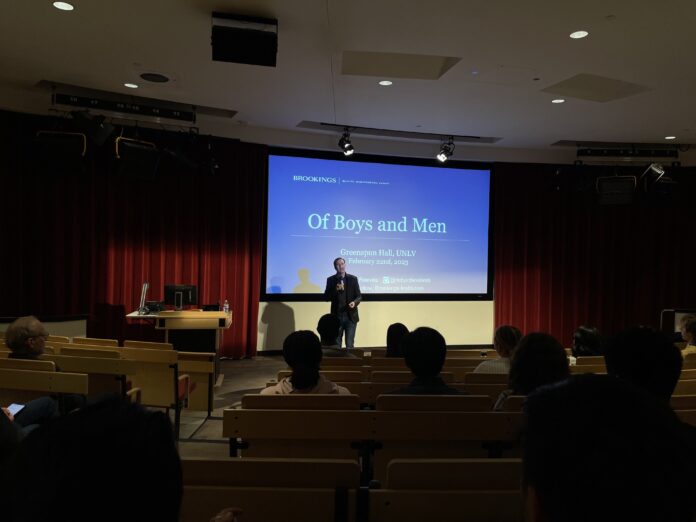
UNLV welcomed Brookings Institution senior fellow Dr. Richard Reeves to the Greenspun auditorium on Feb. 22. Reeves was brought to host a discussion about his book, “Of Boys and Men: Why the Modern Male Is Struggling, Why It Matters, and What to Do about It.”
This was the first return of a Brookings Mountain West lecture of this style in the Greenspun auditorium in three years. In his book’s byline, Reeves posited “A positive vision for masculinity in a more equal world,” and this lecture followed that story through the data and context that shaped the struggles Reeves described.
Reeves began with a discussion as well as international statistics regarding the differences in suicide rates between the sexes. The chart showed clearly higher rates of suicide in the male population. Reeves continued to explain that a study conducted on suicidal men found that many reported feeling worthless or useless.
This moved to a discussion of the way societal pressures exacerbated by certain gender ideals can push men to attach self-worth to economic utility.
Reeves continued to explain that these changes were not isolated incidents but rather the results of broader systemic changes that have been taking place since the 1970s and left many members of the population behind.
A reason for this that Reeves explained was the changes in pay and demographics that have taken place across various major industries including health, education, and technology.
One primary topic that Reeves explained here, as well as momentarily how it relates to education, was the drive for women in STEM careers. This led to a discussion about where many male students were left as we looked at further trends from higher education to elementary school.
The discussion of education greatly highlighted the impacts of early childhood education and the trends that follow all the way through to higher education. Reeves explained that in many areas specifically in early education, female students are outscoring their classmates in terms of early English and Math scores.
Reeves proposed multiple solutions for the issues facing today’s boys and men. Firstly, relating to education Reeves analyzed the impact of technical high school education which provides a form of early specialization that incentivizes career focus.
Additionally, similar benefits were explained relating to apprenticeships, as opposed to technical education, the hands-on learning and connection promote a daily real-world understanding that can prepare students for the future they are now empowered to choose.
Another solution that Reeves discussed related to redshirting, or delaying the entrance to kindergarten amongst male students. Reeves pointed out that this was already common practice, especially at many private schools.
When asked after the lecture about the way that various issues in school lead to the holding back of specifically male students of color, Reeves explained that while these disparities exist, the equalization of normalizing or mandating this delayed interest would remove the social stigmatization that comes from delays in academic progress.
Additionally, Reeves explained that students who have more time to develop are less likely to be held back later in their careers creating this equalizing effect.
The next proposed solution does not relate to the direct method of education, but rather to uplifting men with careers in the field of education. The earlier discussion on education showed that a majority of teachers, especially in early childhood, were women. Reeves explained that by subsidizing career training for men in health, education, administration and literacy fields the career gaps created by these education discrepancies can be lessened.
Additionally, aiming to incentivize more men in these professions, Reeves also prominently featured the idea that many programs specifically designed to promote career advancement and economic mobility are not as efficient for male participants.
Reeves reiterated that as programs around the country were created specifically to uplift women and female students, leave behind warped notions of the role masculinity is left to fulfill.
One of the final examples from Reeves’ presentation was a summary for those thus far unfamiliar with Andrew Tate. Reeves explained that phenomena such as Tate rose to prominence by creating content and promoting a certain idea of what he believes it is to be a man.
By promoting such ideals, Tate has influenced a variety of especially young boys to adjust the way they view the world and their peers. Reeves explained that as consistent gaps continue to emerge in meaningful connection, these needs proceed to be filled online. These online interactions begin to form a baseline for the standard of behavior and perceptions of masculinity.
Reeves believes that a new era of defining masculinity can be both pro-men and pro-equality in order to address what is not a crisis with American men, but rather the ways that structures and institutions for perceiving masculinity have weakened, this image is in need of creative re-invention.
Reeves concluded that while many problems are currently facing American men and boys, the crises that they are facing are a result of failures of imagination, as well as cultural and political failures that have shifted these notions of masculinity and manhood should be tested and redefined.
Anyone looking to find more about Richard Reeves or his book can find information at https://www.brookings.edu/book/of-boys-and-men/ .
Online: Anyone looking to find more about Richard Reeves or his book can find information here.
